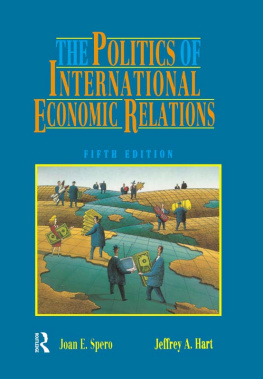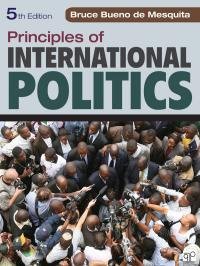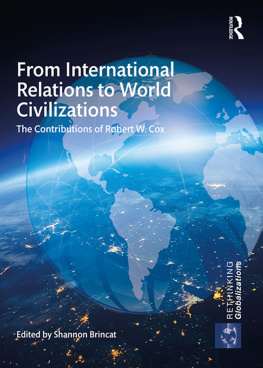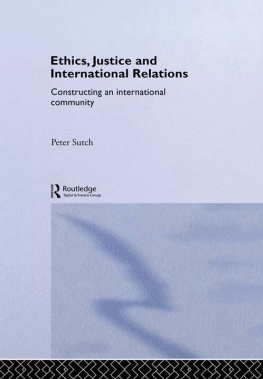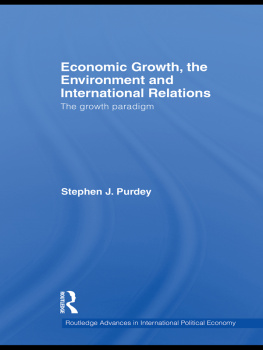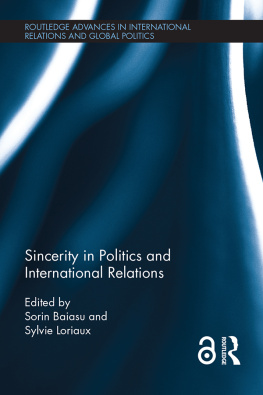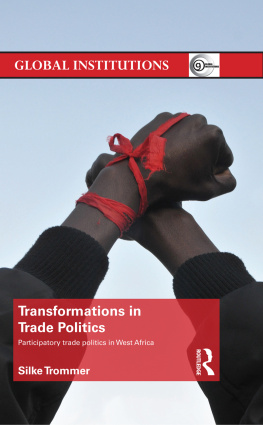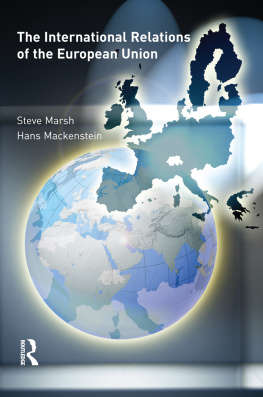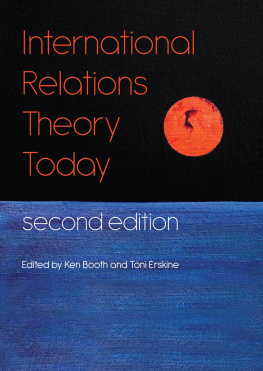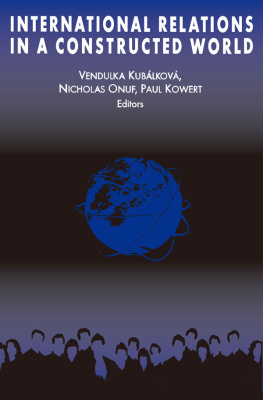The
Politics of
International
Economic
Relations
FIFTH EDITION
The
Politics of
International
Economic
Relations
FIFTH EDITION
Joan Edelman Spero
Jeffrey A. Hart
Indiana University
London and New York
First published 1997
by St. Martin's Press, Inc.
175 Fifth Avenue, New York, NY 10010
Sponsorign editor: Beth A. Gillett
Manager, publishing services: Emily Berleth
Senior editor, publishing services: Douglas Bell
Project management and graphics: York Production Services
Production supervisor: Dennis Para
Cover Design: Patricia McFadden
Cover art: David C. Chen, Stockworks/Martha Production, Inc.
Simultaneously published and distributed outside North America by
Routledge
2 Park Square, Milton Park, Abingdon, Oxfordshire OX14 4RN
and representatives throughtout the world.
Reprinted 2000
Routledge is an imprint of the Taylor & Francis Group
Copyright 1997 by St. Martin's Press, Inc.
All rights reserved. No part of this book may be reprinted or reproduced or utilised in any form or by any electronic, mechanical, or other means, now known or hereafter invented, including photocopying and recording, or in any information storage or retrieval system, without permission in writing from the publishers.
British Library Cataloguing in Publication Data
A catalogue record for this book is available from the British Library
ISBN:0-415-16648-9
Acknowledgements
Acknowledgements and copyrights are continued at the back of the book on page 430, which constitutes and extension of the copyright page.
To Michael, Jason, and Benjamin
JES
To Joan and Zachary
JAH
Contents
Part One An Overview
The Management of International Economic
Relations since World War II
Part Two The Western System
The Multinational Corporation and the
Issue of Management
Part Three The North-South System
The North-South System and the
Possibility of Change
Multinational Corporations in the
Third World
Part Four The End of the Cold War and Its
Consequences for the World Economy
East-West Economic Relations during
and after the Cold War
Conclusion: Globalization and the
New World Order
Preface
The first edition of The Politics of International Economic Relations, published in 1977, was written to fill a void in the study of international relations the gap between international politics and international economics. Since 1977 that gap has narrowed significantly. International political economy has emerged as a new and increasingly prominent field in political science. Theoretical and empirical analyses of the politics of international economic relations appear regularly in professional journals and books. Although the most important bridge building has come from political scientists, economists are now also including political variables in their analyses and applying economic theory to the study of political behavior. At the same time, a new generation of students in a variety of fields is being made aware of the interrelationship of economics and politics and is learning to use and integrate the tools of both fields.
Much has happened since 1977 to reinforce this academic evolution. Above all, the turbulence in the world economy has highlighted the political dimension of international economic relations. The persistent problems of the dollar and other international currencies, the many trade disputes between the United States and its major trading partners, crises in world oil markets, and the continuing financial crises in the developing countries have obliged scholars to reexamine the assumptions that separated the disciplines of economics and political science for over a century.
The focus of analysis and organization in this book has not changed much since the first edition. This edition continues the tradition established in previous ones of discussing problems that are faced by the developing countries and the formerly Communist countries separately from those that primarily affect the industrialized capitalist countries. In this fifth edition, we have added new material that reflects the major changes in the international system since the end of the Cold War. Also in this new edition, we discuss and try to explain the increasing pragmatism of domestic and foreign economic policies in many parts of the Third World, but especially in the faster-growing developing countries. Finally, this edition adds new material on the growing gap between the poorest regions of the world and the richest ones.
The first four editions of this book were written by Joan Spero. Each new edition has reflected a different dimension of her professional experience. At the time the first edition appeared, she was assistant professor of political science at Columbia University. When the second edition was published in 1980, she was ambassador of the United States to the Economic and Social Council of the United Nations. The third edition was published in 1985, when she was senior vice president of international corporate affairs at American Express Company. When the fourth edition was published in 1989, Joan Spero was senior vice president and treasurer at American Express. This book has benefited, in her view, from her experiences in the academic, governmental, and business worlds. Joan Spero is currently Under Secretary of State for Economic, Business, and Agricultural Affairs.
While this new edition of The Politics of International Economic Relations reflects Joan Spero's experience as a senior policy maker in the Clinton administration, it was not written as an official statement of U.S. Government policy, but, rather, as a continuation of the analytical approach of the first four editions. The opinions and views expressed are those of the author and are not necessarily those of the Department of State.
The fifth edition was written jointly by Joan E. Spero and Jeffrey A. Hart, a professor of political science at Indiana University. Hart has also served for short periods in governmental positions. In 1980, he was a professional staff member of President Carter's Commission for a National Agenda for the Eighties. Hart was an internal contractor for the Congressional Office of Technology Assessment in 19851986 and has collaborated since 1987 with members of the Berkeley Roundtable on the International Economy (BRIE), including Michael Borrus, Laura D'Andrea Tyson, currently chair of the National Economic Council, and Stephen Cohen. He echoes Joan Spero's sentiments about the intellectual benefits of combining academic and nonacademic pursuits.
We owe a debt of gratitude to Jeffry Frieden for reading and providing comments on the entire manuscript and to the following individuals for their review of portions of the current edition: Jack Bielasiak, Catherine Gwin, and Stephen Kobrin. We would also like to thank the following reviewers for their time and efforts: M. Mark Amen, University of South Florida; Steve Chan, University of Colorado at Boulder; John A. C. Conybeare, University of Iowa; Patricia Davis, University of Notre Dame; C. Roe Goddard, American Graduate School of International Management; Stephan Haggard, University of California, San Diego; Edward D. Mansfield, Columbia University; Renee Marlin-Bennett, The American University; Curtis Peet, Bowling Green State University; David M. Rowe, The Ohio State University; and Veronica Ward, Utah State University. Extensive research assistance for this edition was provided by Sangbae Kim and Khalil Osman, both graduate students at Indiana University. Previous editions benefited from research assistance provided by Kristin Brady, Stephen Gaull, Christiana Horton, Deirdre Maloney, and Kathleen McNamara. The following individuals provided advice on drafts of previous editions of the book: Andrew Bartels, Toby Gati, Lisa Lamas, Charles Levy, Edward Morse, Richard O'Brien, and John Sewell.
Next page
